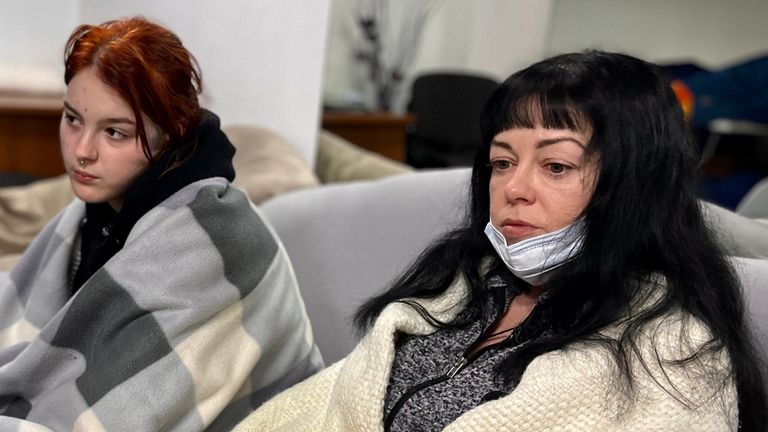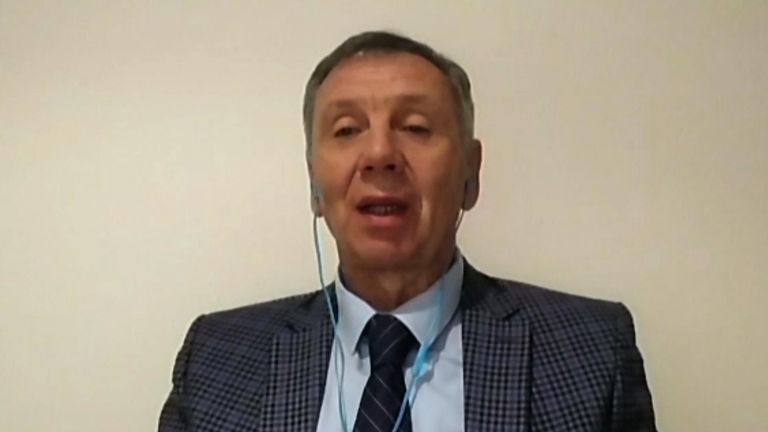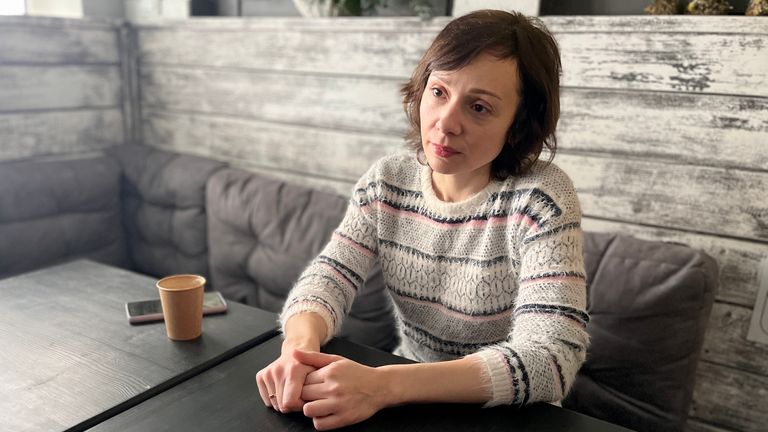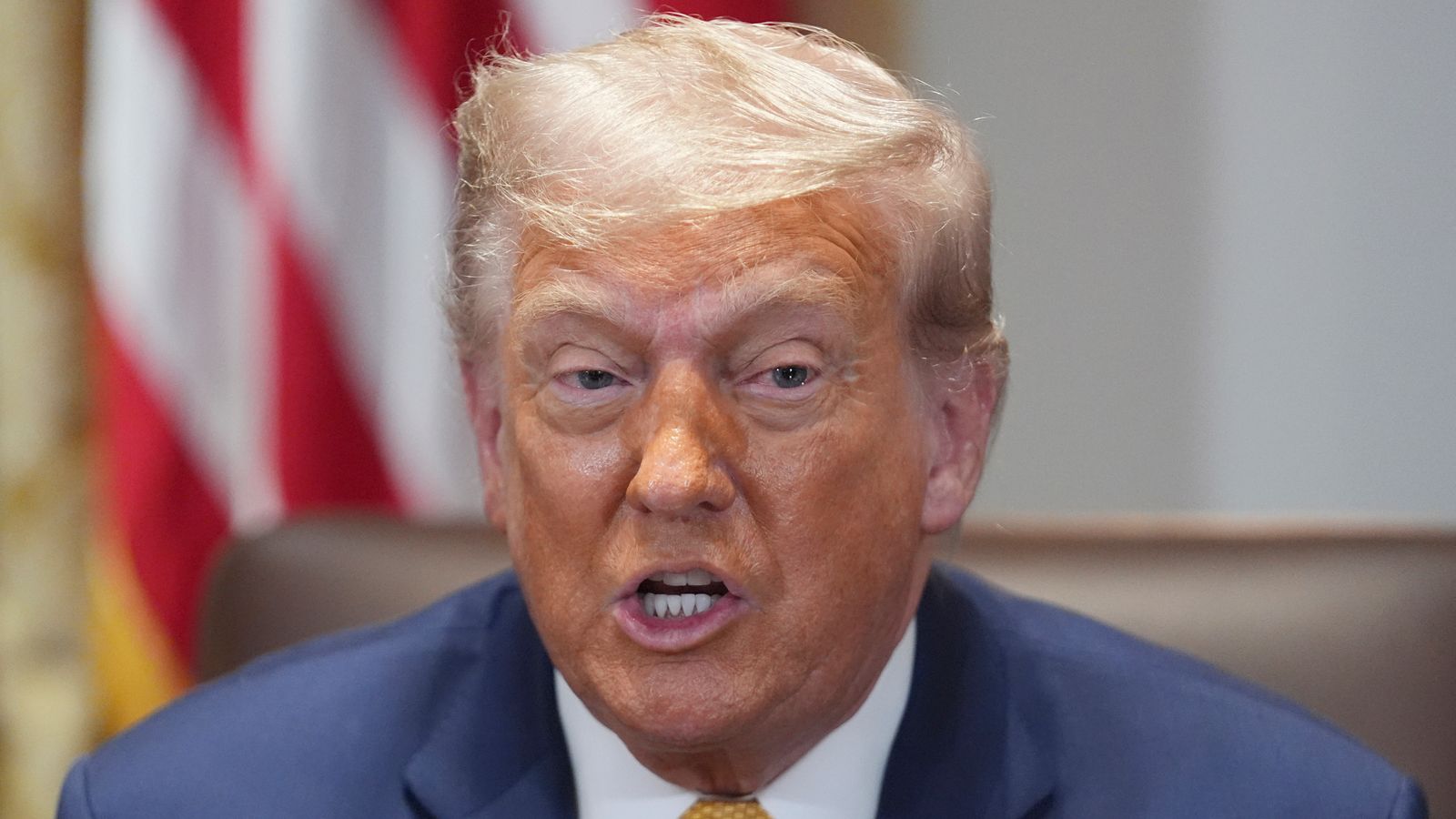
Ukraine has been telling anyone who would listen for months that Russia had a formal state-sponsored plan to effectively steal Ukrainian children, take them to Russia and turn them against their own country.
The Ukrainian government and non-governmental organisations (NGOs) say the number of missing children in the last year alone is more than 16,000.
They say the Russian brainwashing programme dates back to the start of this conflict in 2014, and in that time more than 700,000 children have been illegally moved.
Some parents have grown so desperate, they are risking travelling thousands of miles from Ukraine through Poland, then Belarus and Russia to Crimea to get their children back.
In a hostel in Kyiv set up for refugees, I met Lyudmila Motychak and her 15-year-old daughter Anastasia.
Lyudmila had undertaken this harrowing journey, but she lit up when she showed me the emotional video of the pair reuniting outside a Russian children’s facility in Crimea, after months apart.
Ukraine war latest: Arrest warrant for Putin ‘could hasten his removal’
Sceptical from the start, Lyudmila described how she was effectively tricked into letting her daughter go on a school trip, organised by the Russian-supporting authorities in Kherson and Crimea.
She said: “We were told that it will be a camp, and that the children were going there for two weeks, and they told us not to worry, that they would bring our children back, that a lot of children were going.
“I was afraid to let her go from the beginning. I was saying it’s a war, she shouldn’t go, but they insisted everything would be okay.
“They told me not to worry, everything will be okay. They said there is no war there, everything is good there, they will feed them five times a day and it’s good for her health, and that there is everything there, even a swimming pool.”
Two weeks later when her daughter didn’t return, Lyudmila realised something more sinister was at play.
“They told me it would be very good for my child, but there was nothing like that there, to tell the truth.”
Forced to sing Russia’s national anthem
Lyudmila described how she rang up the teachers, and the director of the educational college that her daughter attended. They kept telling her she would be returned at some point, but that the trip had turned into an evacuation because of the war.
Her daughter Anastasia, who goes by Nastya, told us that when she left Kherson, she departed on a convoy of 100 buses, each carrying 30 to 40 children. That’s more than 3,000 children on just one trip.
The opportunity was described to her as something like a “summer camp”, even though it was October.
But, she says, it was nothing like that.
She described how they were forced to sing Russia’s national anthem and follow strict orders.
“They said to us: ‘We are feeding you, we give you water, and we give you heating and comfort, and you’re so ungrateful.’
“They were confiscating balloons we had in the colours of the Ukrainian flag, and they were also shouting at us, saying: ‘We are ungrateful’, and to ‘go back to your fascists’.”
Read more:
Could Putin be arrested and stand trial for war crimes?
Meet the woman tasked with pursuing Russian president to the dock
‘I want Putin to die’:Shock and anger after dozens of Russian missiles hit Kyiv
When two weeks passed, Nastya asked if she could go home, but the authorities were buying time.
She said: “They started delaying and telling us on this date… you will go back home, don’t worry.
“But we didn’t go when those dates came.
“Then they started telling us other dates, but we never left.
“Then they told us it was an evacuation, and then finally they said we have to stay indefinitely – and that only our parents can come get us out.”
With the help of Save Ukraine, a Ukrainian NGO that helps families travel to Russia and the occupied territories to get their children back, Lyudmila and Nastya were able to reunite.
‘Indoctrination of our children’
Lyudmila believes it was always the plan to take the children for good and then try to convince the parents to follow – and stay.
She said: “They took the children and then they wanted parents to join their children, and then they were promising money, and they were promising homes and apartments, financial help.
“Of course they wanted to people to adopt their way of thinking. They wanted people to join them and play by their rules.”
The Ukrainian authorities and Save Ukraine say this is all part of a detailed strategy Russia had to take Ukraine’s children.
Save Ukraine spokesperson Olga Yerokhina said: “We consider it re-education and indoctrination of our children, and when I think about those children who haven’t got any parents for different reasons, how will we find them at all.”
“We must look at this from the perspective of history. It’s nothing new and this whole thing was prepared. What do they do with children… it’s part of a bigger policy against Ukraine.”
I asked her if she thought it was part of a well-orchestrated plan.
She replied: “Yeah, we understand that it was not only about the full-scale invasion in 2022, it was prepared long before this.”
The exact number of children who have left Ukraine, or been forcibly removed, and may never be seen or heard from again, is unknown.
But the International Criminal Court (ICC) charges may one day bring someone involved to justice. That’s what Olga Yerokhina wants – some kind of concerted international plan and justice.
She said: “We have a lot of work to do.
“We hope the international community and Poland and the United Nations, that together we can create some kind of mechanism to return these children.
“We are realistic. Maybe we can’t do it for all of them, but we have to do as much as we can.”













